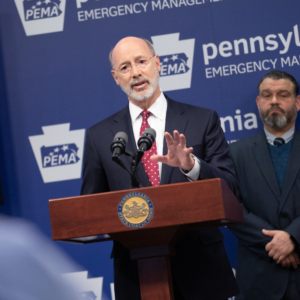For over a year, Gov. Tom Wolf has dismissed calls for transparency as he enforces restrictive emergency executive orders. His disaster declaration for COVID-19—renewed four times since last spring—has allowed him to exert a level of control like nothing our commonwealth has experienced in its 340-year history.
While hiding his decision-making process throughout the pandemic, Wolf has made limited, if any, efforts to present concrete or objective goals related to further reopening Pennsylvania’s economy or ending his emergency powers. Parents attempting to balance work and virtual schooling; businessowners struggling to keep their doors open; or those individuals suffering with isolation and loneliness are left paralyzed, unable to plan ahead or predict when life could return to normal.
It doesn’t have to be this way. Other states are finding ways to improve transparency and provide clear benchmarks for reopening despite the crisis. Wolf’s insistence on secrecy calls into question his leadership and management of the crisis.
From AARP to the ACLU, groups with varied interests—along with elected officials in both political parties—have criticized Wolf’s refusal to release timely information, or relevant data, to justify his arbitrary restrictions on businesses, communities, and even our personal lives. His administration, moreover, won’t take accountability for its actions, creating a level of uncertainty that profoundly affects the livelihoods of Pennsylvanians.
First, the administration ceased fulfilling Right-to-Know requests when state government offices closed last March, and only begrudgingly restarted this key transparency function after an outcry from the media and a showdown with the Legislature last summer. During this time, other elected leaders from Wolf’s own party—including the attorney general, treasurer, and auditor general—continued to process public records requests from their offices.
When government officials exercise extraordinary authority over citizens’ daily lives, they must uphold and even expand transparency measures. But to this day, the Wolf administration has withheld public health data used to justify gathering restrictions and restaurant capacity. Meanwhile, the state health department has argued against public disclosure using technicalities—saying the term “data” is not properly defined, for example, and that information is protected by the 1955 Disease Control and Prevention Act.
Suffice to say, citizens and reporters aren’t buying it. The number of Right-to-Know appeals is on pace to hit 3,200 this year—a 31% increase over the prior year, according to the Office of Open Records’ executive director. In contrast, Minnesota state officials insisted that agencies continue to process open records requests and even encouraged the government to waive photocopying fees.
Meanwhile, just across the border in Ohio, Governor Mike DeWine has presented clear and objective goals. To take one example, the state’s COVID-19 restrictions will end once Ohio reaches 50 cases per 100,000 people for two consecutive weeks. As it stands, the state is experiencing more than 175 cases per 100,000. In other words, unlike Wolf, DeWine is offering a clear, science-based goal that can help Ohioans plan for the future.
Ohio isn’t an anomaly. In Texas, reopening is underway with a provision that if COVID-19 hospitalizations in any of the state’s hospital regions rise above 15% of bed capacity for seven straight days, a county judge may authorize mitigation strategies. Again, the state is using clear, objective metrics to guide the economy’s safe reopening. It’s time, no doubt, for Wolf to give Pennsylvanians a similar sense of optimism, rather than an entrée of COVID policies that contribute to population loss.
As Tim Sudall, a National Association for Catering and Events regional president, told PennLive, “How, after nearly of (sic) year of managing this pandemic, do we not have clear steps and metrics outlined to return businesses to full capacity?” Thanks to Wolf’s indefinite emergency powers—and ongoing restrictions—business owners have struggled to survive the COVID era. After this past year, they deserve transparency from Pennsylvania’s governor.
The verdict is clear: Wolf has let Pennsylvanians down. He has consistently withheld information on nursing homes, business waivers, occupancy limits, and general reopening measures.
This spring, Pennsylvania voters can ensure this never happens again. May’s primary ballot will offer the opportunity to constitutionally limit any governor from extending emergency declaration powers without legislative approval. Our communities cannot endure an encore of state-enforced lockdowns. On May 18, Pennsylvanians should vote “Yes” on the two constitutional amendments to protect their rights and restore local control.

Elizabeth Stelle is the Director of Policy Analysis at the Commonwealth Foundation, Pennsylvania’s free-market think tank.

